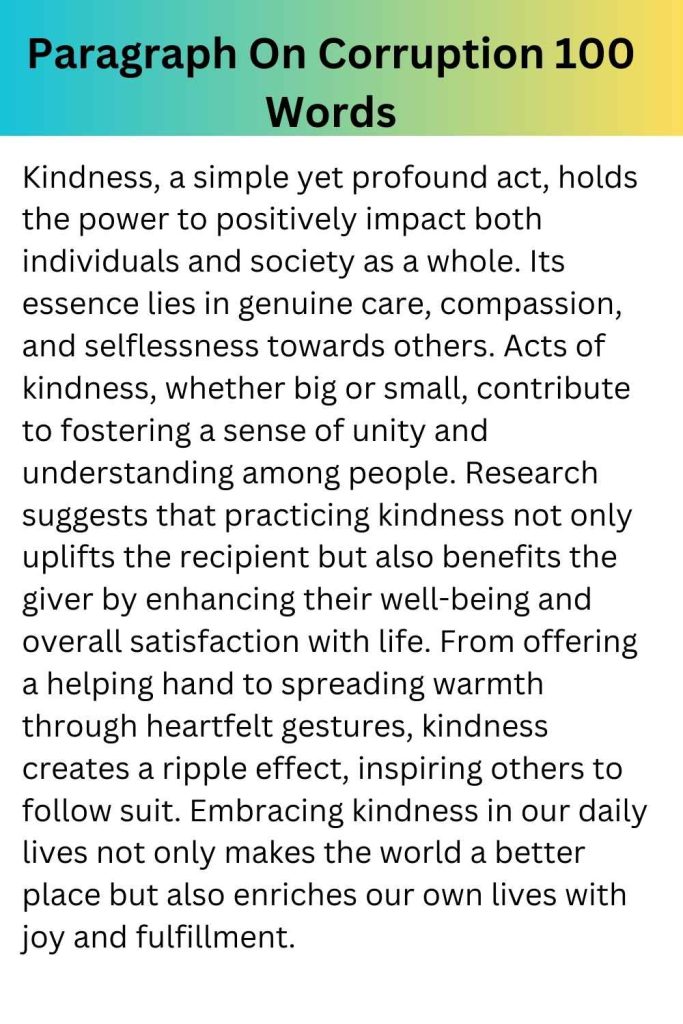Paragraph On Corruption in 100,150,200,250 Words
Paragraph On Corruption For Class 9
Corruption, a pervasive issue in many countries, has significant impacts on society. It undermines trust in institutions, hampers economic growth, and perpetuates inequality. In education, corruption in admissions to universities can prevent deserving students from accessing higher education opportunities. In healthcare, corruption can lead to substandard care and unequal access to medical services. Moreover, corruption in labor unions and arms trafficking can further exacerbate social and political instability. Addressing corruption requires collective efforts, including promoting transparency, accountability, and ethical conduct in both public and private sectors. By combating corruption, countries can foster a fair and just society where opportunities are accessible to all, irrespective of their social or economic background.
Paragraph On Corruption For Class 10
Corruption is a pressing issue that affects countries around the world, impacting their economies, societies, and governance systems. It refers to the misuse of power for personal gain, often resulting in unfair advantages for some individuals or groups at the expense of others. In many countries, corruption is widespread, occurring in various sectors such as education, healthcare, and government. For example, in the education sector, corruption can manifest in bribery for university admissions or the sale of academic degrees. In healthcare, corruption may involve embezzlement of funds meant for public health services or the acceptance of informal payments by patients. The consequences of corruption are far-reaching, hindering economic growth, exacerbating inequality, and undermining public trust in institutions. Efforts to combat corruption often involve measures to increase transparency, accountability, and public participation in decision-making processes. Overall, addressing corruption is essential for promoting fairness, integrity, and sustainable development in any country.
Paragraph On Corruption For Class 11
Corruption, a pervasive issue in many countries worldwide, exerts profound impacts on societies and economies. Its detrimental effects extend across various sectors, including education, healthcare, and governance. In the education sector, corruption in admissions to universities hampers merit-based access to higher education, perpetuating inequality and hindering social mobility. Similarly, corruption in healthcare systems undermines public welfare by diverting resources away from patient care and compromising the quality of medical services. Moreover, corrupt practices in governance erode trust in public institutions, weaken the rule of law, and impede economic growth. Addressing corruption requires collective efforts, including transparency, accountability, and the promotion of ethical conduct. By combating corruption, countries can foster fairer societies, enhance public trust, and stimulate sustainable development.
Paragraph On Corruption For Class 12
Corruption, a pervasive issue affecting societies worldwide, holds significant implications for any country. Its detrimental effects are felt across various sectors, including education, healthcare, labor unions, arms trafficking, philosophy, and religious organizations. In education, corruption undermines the fairness of admissions processes, perpetuating inequality and hindering economic growth. Similarly, corruption in healthcare compromises public welfare by diverting resources and distorting service delivery. Labor unions can be influenced or controlled by corrupt leaders, while arms trafficking fuels conflicts and undermines international security. Even philosophy and religious institutions are not immune, with corruption eroding ethical principles and fostering hypocrisy. Overall, corruption undermines trust in institutions, distorts economic incentives, and perpetuates social inequality, making it a pressing challenge for any nation to address.
Paragraph On Corruption 100 Words
Corruption, a pervasive issue in many countries worldwide, significantly impacts various aspects of society. It undermines trust in public institutions, erodes the rule of law, and hinders economic development. In education, corruption in admissions to universities can lead to unfair advantages for some individuals, compromising the integrity of the academic system. Similarly, corruption in healthcare can result in substandard medical services, putting public welfare at risk. Moreover, corruption in labor unions can lead to exploitation of workers and unfair practices in the workplace. Addressing corruption requires concerted efforts from both government and civil society to promote transparency, accountability, and ethical conduct in all sectors of society.
Paragraph On Corruption 100 Words PDF

Paragraph On Corruption in 150 Words
Corruption poses significant challenges in any country, affecting various sectors such as education, healthcare, and governance. In the realm of education, corruption in admissions processes and academic evaluations undermines the integrity of institutions, hindering the merit-based selection of students and faculty. This not only compromises the quality of education but also perpetuates inequality and erodes trust in educational systems. Similarly, corruption in healthcare leads to misallocation of resources, reduced access to quality care, and compromised public health outcomes. Moreover, corrupt practices within governmental bodies and businesses impede economic growth, deter foreign investment, and foster an environment of impunity. Ultimately, the pervasive nature of corruption undermines the rule of law, erodes public trust in institutions, and perpetuates social and economic disparities. Addressing corruption requires concerted efforts from governments, civil society, and international organizations to implement transparent and accountable governance mechanisms, strengthen anti-corruption laws, and promote ethical behavior at all levels of society.
Paragraph On Corruption 200 Words
Corruption, a pervasive issue worldwide, has significant impacts on any country. From education to healthcare, labor unions to arms trafficking, and even within religious organizations, corruption manifests in various forms, affecting every sector of society. In education, it undermines fairness by allowing bribery and fraud in admissions and academic evaluations, hindering the pursuit of knowledge and the development of skilled professionals. Similarly, corruption in healthcare jeopardizes public welfare, as it can lead to misallocation of resources, substandard care, and inflated costs. Labor unions, intended to protect workers’ rights, may become tainted by corrupt leaders who prioritize personal gain over the well-being of their members. Moreover, arms trafficking fueled by corruption not only destabilizes regions but also perpetuates violence and conflicts. Even religious institutions, meant to uphold moral values, are not immune, as historical examples show instances of corruption within their ranks. Overall, corruption undermines trust in institutions, distorts economic growth, and perpetuates inequality, making it a formidable challenge for any nation to address.
Paragraph On Corruption 250 Words
Corruption is a pervasive issue that can have profound impacts on any country, affecting various sectors such as education, healthcare, labor unions, arms trafficking, philosophy, and religious organizations. In the education sector, corruption in admissions to universities is a common problem worldwide, hindering fair access to educational opportunities. This can lead to the formation of corrupt hierarchies within educational institutions, perpetuating a cycle of unethical behavior. Similarly, corruption in healthcare can endanger public welfare, as resources meant for healthcare services may be misappropriated or embezzled, leading to inadequate care for those in need. Labor unions may also fall prey to corruption, with leaders engaging in illicit activities or being influenced by criminal entities. Arms trafficking fueled by corruption not only undermines international laws but also fuels conflicts and instability in various regions. Even philosophy and religious organizations are not immune, with instances of corruption undermining the integrity of these institutions. Overall, corruption erodes trust in institutions, impedes economic growth, and perpetuates inequality. Addressing corruption requires a concerted effort from both government institutions and civil society to promote transparency, accountability, and ethical conduct at all levels of society.







